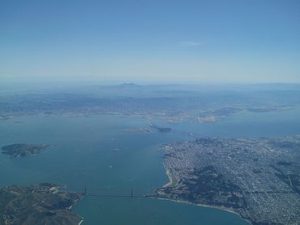Immigrant arrival
According to archived weather records, the afternoon temperature at San Francisco Airport on Saturday May 20, 1967 hovered around seventy degrees. Fog had rolled in the previous night, but the mid-afternoon sky was clear, with visibility ten miles. As the British Airways plane dropped lower and lower over the waters of the bay, the surrounding hills became visible. Something about the quality of the light triggered a thought in my mind: this is the landscape of home.
It wasn’t the place where I grew up. Tauranga, New Zealand, is 6,500 miles southwest across the Pacific from California. But Tauranga’s distance from the equator, latitude 38 ? S, is the same as San Francisco’s to the north. The view from the air of San Francisco Bay and surrounding hills has similarities with Tauranga Harbour. Tauranga’s climate is subtropical and humid; it’s a rare day with no cloud in the sky. Even in the San Francisco Bay Area’s Mediterranean climate, with its clear summer skies, the ever-present offshore fogbank spreads a blue mistiness over the hills.
Part of the triggered thought was relief at finally coming back to terra firma. It had been a long flight, twelve hours over the pole from London. The journey had been made as comfortable as possible. The Silicon Valley company hiring my husband Tony had paid for first class tickets. The airline put us right up front, where there was plenty of legroom, and wall space to hook up a crib for our 18-month-old baby, who slept most of the way, sitting up occasionally to exclaim, “Airp’ane! Airp’ane!” The food was excellent, according to Tony. Our four-year-old son and I didn’t want to know. The two of us huddled together, miserable with airsickness.
Sight of the San Francisco Bay also signified something deeper: a recognition that this journey was the start of a new life. We were no longer in England, where the class system had us labeled as “colonials” and therefore outsiders. We were not heading back to our birth country, where the old baggage of family relationships and kiwi social assumptions would reassert their weight. We were free to find our own place in the rapidly growing, multi-cultural landscape of the exciting new high tech industry.
When we moved to England, we were unclear about how long we planned to stay. We stored boxes of belongings in New Zealand, as if we planned to return, and our mindset while we lived in England was that of visitor rather than permanent resident.
This move was different. We were immigrants, Resident Aliens in the terminology of our green cards. I knew there would be culture shock. I had experienced this phenomenon, unexpectedly, our first months in England. I had to drop all the slang I had grown up with, and was unsure how to correctly use English colloquial expressions. (Did to “go up to Oxford” mean to take the train from London or to attend the university? If the former, did one “go up” to other universities too?) This time I knew to expect that attitudes, ways of talking, and subtle social cues would be unfamiliar. Like caterpillars metamorphosing into butterflies, we would slowly take on the coloration of our new country.


Timely piece, Maureen. To picture your unease that “attitudes, ways of talking, and subtle social cues would be unfamiliar,” magnifies how yet more difficult it is for new immigrants who grew up in other languages and with vastly different cultures. I like to think they too will find themselves morphing as slendidly as you have, and that our country will once again open itself to people from all parts of the world for it gives us the potential to develop a society as richly textured as an intricately woven tapestry.
Maureen,
Very visual writing. I too took photos from planes, flying places.
It allows time to conjure up feelings and memories from other days.
Nice to have you become American citizens. We do remember the ceremony in the Santa Barbara Court House.
My, time takes its toll in life,but memories linger to savor in our last days.
I keep awaiting each chapter of the experiences that you are unveiling! Love this description of your new home.